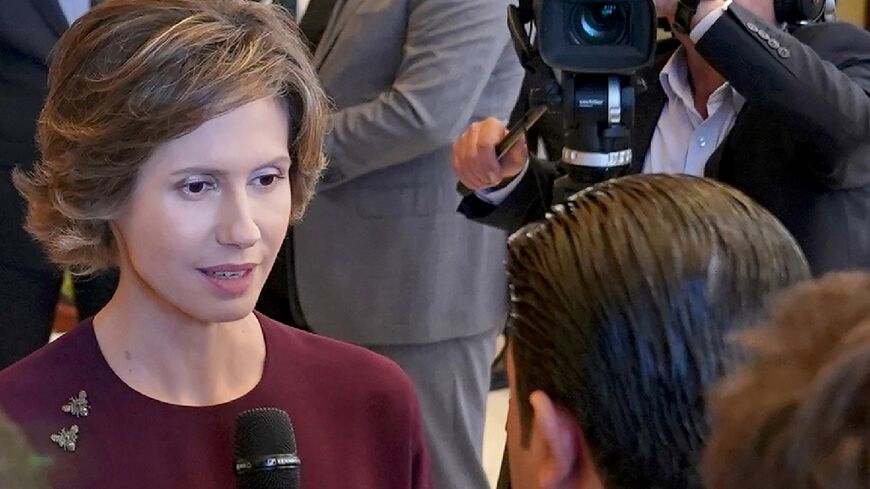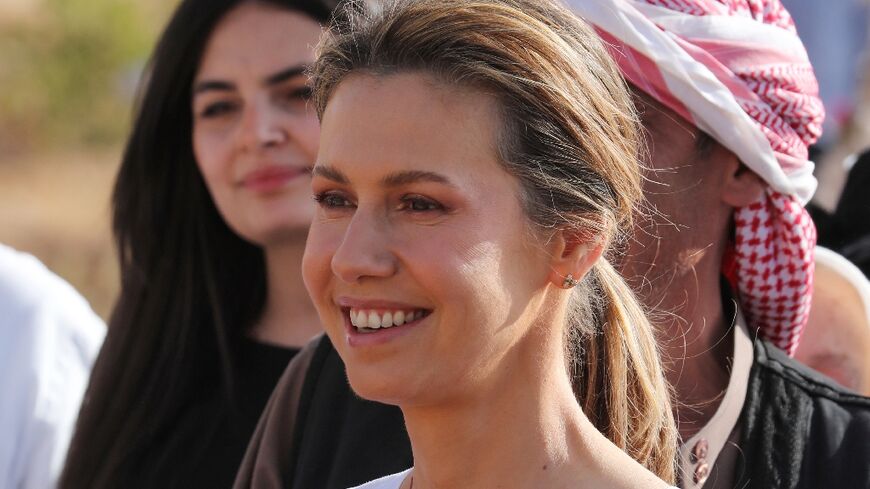Syrian first lady Asma al-Assad’s leukemia diagnosis: What we know
Assad is facing a relatively difficult path to recovery due to her history of breast cancer, a leukemia expert told Al-Monitor, with sanctions on Damascus further complicating her treatment options.

Syrian First Lady Asma al-Assad is being treated for a form of leukemia, Syria’s presidency announced on Tuesday. Her recovery will depend on a variety of factors, including whether she receives treatment in Syria or abroad, according to one medical expert.
What happened: The Syrian presidency said in a statement that Assad was diagnosed with acute myeloid leukemia after medical examinations following the occurrence of “several symptoms and clinical signs.” Assad will undergo a “special treatment protocol” that includes isolation and will refrain from working and participating in other activities during this period, the presidency said.
The daughter of Fawaz and Sahar Akhras of the Syrian city of Homs, Asma al-Assad, 48, was born and raised in the United Kingdom. She married Syrian President Bashar al-Assad in 2000, shortly after he became president.
In 2018, Assad was diagnosed with breast cancer. The following year, she said she had fully recovered after receiving chemotherapy for a malignant tumor. She was treated at a Syrian military hospital, Reuters reported at the time.
Acute myeloid leukemia is a type of cancer that occurs when the body’s bone marrow produces abnormal blood cells, according to the US’ National Cancer Institute.
What it means: A leukemia expert with knowledge of Syrian politics who declined to be named said Assad’s recovery will depend on several factors, including her karyotype — meaning her chromosomes — and the type of mutations present in her body. She will likely need intensive chemotherapy as well as a stem cell also known as a bone marrow transplant.
Because Assad has previously undergone chemotherapy, she has what is called therapy-related acute myeloid leukemia, which is harder to recover from, the expert said.
“The cure rate will be lower because she has therapy-related leukemia following her chemotherapy on breast cancer. So under an optimal sequence, the cure rate will be probably close to 40%, rather than 60% or 70%,” the expert told Al-Monitor.
According to the expert, the optimal treatment for Assad, including the cancer drug venetoclax, is not available in Syria.
“Syria does not have good transplant centers, novel high intensive therapy and venetoclax,” he said, adding that doctors in the country would instead use the so-called 7+3 regimen of lower intensity chemotherapy.
The ideal treatment is available in the United States as well as in Assad’s native United Kingdom, according to the expert. The Syrian presidency did not mention specifics on the treatment, including its location.
Like the United States, the United Kingdom maintains various sanctions on the Syrian government. The Syrian first lady faces travel bans and asset freezes from the European Union. In 2021, the UK's Metropolitan Police opened a preliminary investigation that could see Assad stripped of her British citizenship on terrorism-related charges.
The expert said the cure rate for therapy-related AML in Syria is under 20% in cases of chromosomal abnormalities or unfavorable mutations.
Know more: The quality of cancer treatment in Syria has been impacted by the ongoing civil war. According to the 2022 book "Cancer in the Arab World," “The rapid progress and promising developments in oncology care in Syria were interrupted by the conflict with effects including shortage of drugs and availability of specialized medical equipment.”
The authors wrote that sanctions are worsening the situation.
“Sanctions have prevented the entry of essential medical supplies into the country, including those for cancer treatment which are not produced locally,” they wrote.
According to the US Treasury Department, however, American citizens are not prohibited from sending most medicines to Syria, and do not require a license for such activity.







